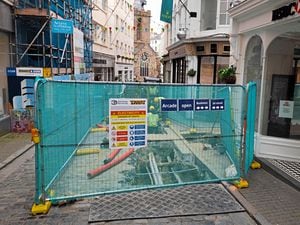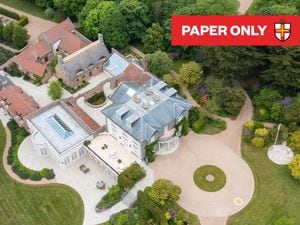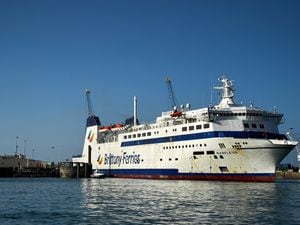Drugs-bust builder keeps tax-dodge cash
A CONVICTED drug importer yesterday kept £21,900 cash that police found in his home.
A CONVICTED drug importer yesterday kept £21,900 cash that police found in his home. Builder Mark Tacon convinced the Royal Court that the stash of English £50 notes was not drug money.
It was, he said, from work for which he had been paid cash in hand to evade income tax.
Tacon, 41, was jailed last November for nine years after being involved with two other men in bringing 75kg of cannabis and 118g of amphetamine into Guernsey. The former was the largest individual local seizure of Class B drugs, with an estimated value of £600,000.
Police raided the defendant's house on the day he was arrested in November 2004.
On Tacon's direction they recovered the money from a locked cash tin locked within his office bureau.
The court heard the address was the administrative office of building firm Falla and Tacon, which he co-owned with friend and long-term business partner Dave Falla.
The prosecution case was based on the statutory assumption that the money was proceeds or reward for his involvement in drug dealing.
But the jurats voted 10-1 that this was not the case.
Tacon was adamant that it was his share of cash payments for building work.
English £50s were the easiest way to store large sums and could be exchanged anywhere in the world.
Mr Falla, appearing for the prosecution, said Tacon had dealt with all the finances and he had trusted him unequivocally.
The company did not demand payment in cash but arranged for some clients to do so, often involving discounts, so that the income could be concealed for tax reasons, Tacon said.
The court heard that this was common in the building trade.
Tacon said he liked to manage his finances that way and the cash was used to cover day-to-day expenses, holidays and the development of property he owned.
Testimony from his business partner, wife and two clients supported his claims.
The money was divided into eight bundles of £2,500 - seven of which were date-stamped - and one of £1,900.
The court heard from main prosecution witness Customs officer Martin Waters. He led the search of Tacon's house and investigated his financial affairs. His discoveries included 46 invoices for building work carried out by Falla and Tacon. Some had been recovered from the search while the defence had provided others.
The prosecution accepted that all the invoices were genuine and that Tacon had cooperated with every step of the investigation.
Mr Waters produced a schedule to the court of all invoices for cash payments sent out in 2004, which totalled £96,516. Advocate Fiona Russell, for the Crown, suggested that as all but two of the bundles of money found in the tin were date- stamped after 29 July 2004, the money could equate only to cash payments received from that date.
The court heard that such payments were divided approximately 60:40 between Tacon and Mr Falla respectively as part of their wages.
Advocate Russell estimated that the total cash received after the end of July was £35,000 and said that after splitting it 60:40, the defendant would be left with a sum approximately equal to what was found in the tin. But she argued that this did not allow for any of the outgoings for which the defendant claimed the money was intended.
But the defence refuted that with evidence that several cash payments had been made to the company for work when no invoices were sent out. Therefore Tacon potentially received much more than that figure.
Witness Brian Le Prevost, who had worked as a subcontractor for the defendant's company in the past, told the court he had paid £8,360 in cash for an extension to his house. He had received a quote before the work, but received no invoice for his payment.
'It was an understood agreement,' he said.
Mr Le Prevost confirmed he paid for the work in English £50 notes saying it was the most convenient way to pay such a large sum.
Stefanie Le Cheminant, a longstanding client, said she had made a cash payment in English £50s of £4,900 for work carried out in the latter half of 2004.
'I was happy to do it. Payment in cash is a custom of the building trade,' she said.
Tacon said his bureau contained two cash boxes.
The larger one from which the cash was recovered was the main reserve. Money from that was changed into smaller notes which were kept in another tin to cover immediate living expenses.
Although no money was discovered in the smaller tin at the time of the search, his wife, Noreen, confirmed this arrangement.
The court heard that as the drug import had been foiled before any financial gain was made, there was no reason for Tacon to have received any reward from it.





